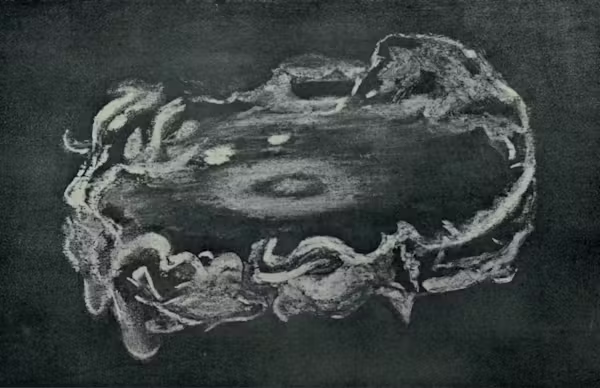
Weird Theories

Lofty Only in Sound: Crossed Wires and Community in 19th-Century Dreams
Alicia Puglionesi explores a curious case of supposed dream telepathy at the end of the US Civil War, in which old ideas about the prophetic nature of dreaming collided with loss, longing, and new possibilities of communication at a distance. more

At the end of the 19th century, inspired by radical advances in technology, physicists asserted the reality of invisible worlds — an idea through which they sought to address not only psychic phenomena such as telepathy, but also spiritual questions around the soul and immortality. Philip Ball explores this fascinating history, and how in this turn to the unseen in the face of mystery there exists a parallel to quantum physics today. more

Hyperspace, ghosts, and colourful cubes — Jon Crabb on the work of Charles Howard Hinton and the cultural history of higher dimensions. more

When the Birds and the Bees Were Not Enough: Aristotle’s Masterpiece
Mary Fissell on how a wildly popular sex manual — first published in 17th-century London and reprinted in hundreds of subsequent editions — both taught and titillated through the early modern period and beyond. more

Illustrations of Madness: James Tilly Matthews and the Air Loom
Mike Jay recounts the tragic story of James Tilly Matthews, a former peace activist of the Napoleonic Wars who was confined to London's notorious Bedlam asylum in 1797 for believing that his mind was under the control of the “Air Loom” — a terrifying machine whose mesmeric rays and mysterious gases were brainwashing politicians and plunging Europe into revolution, terror, and war. more

The terrifying Great Norway Serpent, or Sea Orm, is the most famous of the many influential sea monsters depicted and described by 16th-century ecclesiastic, cartographer, and historian Olaus Magnus. Joseph Nigg explores the iconic and literary legacy of the controversial serpent from its beginnings in the medieval imagination to modern cryptozoology. more

With his enormous range of scholarly pursuits the 17th-century polymath Athanasius Kircher has been hailed as the last Renaissance man and "the master of hundred arts". John Glassie looks at one of Kircher's great masterworks Mundus Subterraneus and how it was inspired by a subterranean adventure Kircher himself made into the bowl of Vesuvius. more

The Last Great Explorer: William F. Warren and the Search for Eden
Of all the attempts throughout history to geographically locate the Garden of Eden one of the most compelling was that set out by minister and president of Boston University, William F. Warren. Brook Wilensky-Lanford looks at the ideas of the man who, in his book Paradise Found, proposed the home of all humanity to be at the North Pole. more




